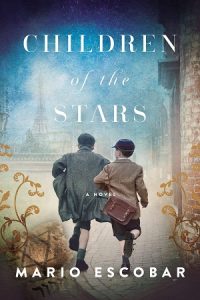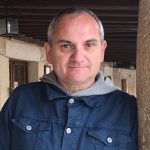What was the most challenging part of writing Children of the Stars?
 Getting in the eyes of a child is not easy. I was inspired by the relationship between my daughter Andrea and my son Alejandro, who at that time were of similar ages. Their reactions, their emotions and enthusiasm gave me the necessary material for the main characters. The shadow of the success of my previous novel was always on me. My wife gave me great advice: What needs to be done after writing a great story? Write the following [one]. Now Children of the Stars will come out in nine languages, a blessing from God.
Getting in the eyes of a child is not easy. I was inspired by the relationship between my daughter Andrea and my son Alejandro, who at that time were of similar ages. Their reactions, their emotions and enthusiasm gave me the necessary material for the main characters. The shadow of the success of my previous novel was always on me. My wife gave me great advice: What needs to be done after writing a great story? Write the following [one]. Now Children of the Stars will come out in nine languages, a blessing from God.
Was there any part of the process of this novel that surprised you?
I always feel like the first reader of my books, as if they were opening in front of me. I didn’t know the end until shortly before I wrote it. What surprised me most was the strength of a secondary character, an old theater producer who helps children and whom I ended up loving especially.
Your novel is about two Jewish boys living in World War II-era France. It was originally written in Spanish and has been translated into English. Have you had any concerns as an author in getting your books translated in general, and specifically with this one, given all the cultures involved?
I have the best translator in the world, Gretchen Albernathy. She always improves my books. She is conscientious, awake, fast, and above all sincere. Translating is a true art. Without translators and proofreaders, writers would be lame or one-armed.
You have a degree in history. How does this inform what you write?
 It influences a lot. I have a degree in modern history, and I did a PhD on Protestantism in the 16th century in Spain. History gives me a broad view of things, to put stories in context and be rigorous in research. Then fiction helps me reach people’s hearts.
It influences a lot. I have a degree in modern history, and I did a PhD on Protestantism in the 16th century in Spain. History gives me a broad view of things, to put stories in context and be rigorous in research. Then fiction helps me reach people’s hearts.
No one changes for conviction; our true engine is the heart. My books seek the return to the values of Christ, His unconditional love for humanity without making distinctions of any kind.
Your novels are a fascinating array of non-fiction, historical, suspense, and even speculative stories, based on facts. How do you choose what you’re going to write next?
The stories look for me, but one of my most important parameters is that they touch my heart. I have a very large library in my house, more than 60,000 volumes, but I believe in the stories that stay lodged in the heart and make us better people.
Click thru to learn why the Church plays such an important role in his books…


